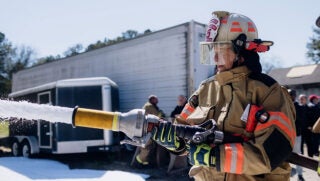As America grapples with a host of agricultural concerns – including climate concerns, narrowing profit margins, and urban development of farmland — one overarching issue is the increasing age of the average farmer. This has long been raising questions about the future of the ag sector.
Specifically, Black farmers tend to be much older than the average farmer, with 43 percent of Black farmers over the age of 65, compared with only 34 percent of farmers as a whole. Historically, the total number of Black farmers peaked in the 1920s at nearly 1 million, but has significantly decreased today to fewer than 50,000.
With this shrinking population, Teresa Ervin-Springs and Kevin Springs are worried about what this means for Black farmers and their legacy. Together, they operate and manage TKO Farming, a 73-acre farm in McCool, Mississippi, that was passed onto them from Springs’ mother.
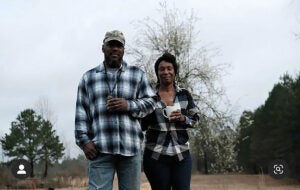
The couple, who originally worked in the nonprofit sector on criminal justice reform, first met in 2013 in Miami. Despite his connection to a generational family of farmers, Springs had little interest in farming as a career. Similarly, Ervin-Springs, who grew up in Fort Lauderdale, considered herself solidly a city kid.
It wasn’t until Springs’ mother fell ill and passed the deed to the family farm to him that the thought of farming and agriculture crossed the couple’s minds.
Still, it wasn’t exactly a calling right from the start.
“The farm was so dilapidated, trees overgrown, with grass taller than I was. The house was in disrepair … it was not a farm at all,” said Ervin-Springs when she and her husband first came by to see the property in 2016.
The farm had been passed through multiple generations of Springs’ stepfather’s family. His stepfather, Archie Thompson, the most recent owner, passed away in 2014. With his health failing him prior to his passing, there was no one to maintain the farm for years.
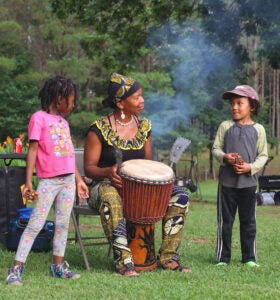
Even though the couple didn’t see a farm on the property, that wasn’t the case for others. When they visited, Springs asked a Mississippi State Extension agent to survey the land. The agent saw a “diamond in the rough” and identified the foundation and care that had originally been put into the farm.
The turning point for the couple came when they did a final walk-through with a forester. The forester chatted with the two of them about the land, animal habitats, and other features.
When a light rain began to fall, Ervin-Springs said she could feel her perception of the land change.
“Kevin and I kept smiling at each other,” she said. “It started to rain a little, and we saw a rainbow. We were just in awe of everything.”
After that walk, she said, “Something opened up in us, and we realized the responsibility that we had, and we began to see the beauty in [the farm’s] history.”
Despite having zero training in farming, the couple began putting in the time and effort to restore and rebuild his family’s farm.
By March 2017, they felt that they had studied and learned enough to begin planting and growing crops. Mentors and community members were drawn in to help with the endeavor. By June that year, they had their first crop, described by Ervin-Springs as “way too much” of tomatoes, kale, cucumbers, green beans, okra, and so much more.
Ervin-Springs, ever on the lookout for unrestricted funding, first saw the callout for American Farmland’s Trust’s Brighter Future Fund (BFF) after writing a blog post for Farm Aid, who then sent her information about the BFF application.
The couple used their funds from the Brighter Future Fund to re-establish the fencing around their 2-acre vegetable crop.
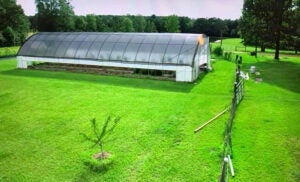
With the help of their many mentors, as well as the Winston County Self Help Cooperative, Natural Resources Conservation Service, and Mississippi Extension Agents, the couple rebuilt the thriving farm on his family’s property.
While farming, the couple also found themselves in a situation that they had not anticipated — they were lonely. Loneliness is something that many farmers face, and combatting the weight of it can be incredibly difficult.
For the two of them, who came from a background of working closely with community members through their nonprofit work, it felt natural to draw in community members to engage with them on their farm.
They started by establishing youth mentorships with local churches in their area. Then, they expanded to host field days with co-ops nearby, and this snowballed into hosting young adult educational exchanges with Williams College, where students come to the farm for a week-long crash course in agriculture and Black land stewardship.
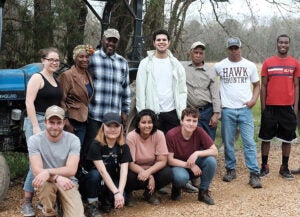
As the couple engaged more with their community members, it became clear that they were younger than many of their farming mentors. When they started farming, Teresa Ervin-Springs and Kevin Springs, at ages 52 and 50, were often the youngest farmers in the room wherever they went.
As they hosted students in their community outreach programs, they began to see a generational gap between elder farmers, who carried with them a wealth of knowledge about farming practices, and the younger generation, who had very little exposure, let alone expertise, in agriculture.
The couple also recognized that, as Black farmers, there was an enduring legacy of racism and discrimination that they faced, and any minority or underrepresented identity trying to break into farming would also face hardship.
Ervin-Springs felt compelled to bridge this knowledge gap while simultaneously fostering a safe and inclusive environment for those interested in agriculture.
This led to the formation of Ancestral BeKin, a for-profit consulting organization built on a portfolio of learning curves related to farming.
“With everything that’s going on in the world, building or being a place where people can come and learn in safety no matter who they are is very important,” she said.
The name of her organization came from a moment of inspiration that Ervin-Springs had while outside stoking a fire — a moment when she had an intense connection with her land. She remembered a quote: “I feel the energy of an ancestral beacon … guiding us to build a community that echoes our elders’ memories of this land, building towards the future we all deserve.”
Ervin-Springs wanted to combine the sentiment of the farm as being a “beacon” with the kinship of community while honoring the Thompsons’ farming ancestors. So, she settled on Ancestral BeKin as the organization’s name.
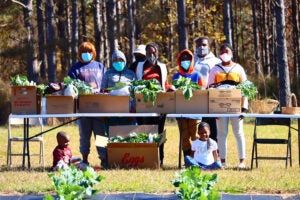
By establishing programs to help guide and educate those interested, Ervin-Springs hopes that Ancestral BeKin can facilitate a safe space for anyone who is interested in agriculture to learn.
Some testimonials from people who have gone through the program include someone who had recently moved from Chicago using a power tool for the first time and the empowerment that came with it. According to a testimonial, they “saw how the building process built up [that person’s] own self-confidence — this is a space where people feel safe trying new skills, learning from mistakes without judgment.”
Another testimonial talked about how the program “was like a breath of fresh air, a break from survival mode, an opportunity to dream about and work towards a future that preventatively meets our community’s needs.”
Currently, Ervin-Springs is working on meeting with sponsors, potential partners, and other community members to see how they can move this mission forward. To learn more about Ancestral BeKin and support this cause, please consider donating here.
“It would be selfish to end what we’ve learned on the farm and about the community in agriculture with TKO Farming,” she said. “Ancestral BeKin will carry [what we’ve learned] forward.”
This article was published on AGDAILY on behalf of American Farmland Trust.
American Farmland Trust’s Brighter Future Fund provides grants to help farmers nationwide improve farm viability, access, transfer or permanently protect farmland, or adopt regenerative agricultural practices. In 2022, the fund began prioritizing funding for farmers who identify as BIPOC, Veterans, LGBTQIA+ and beginning farmers who had limited access to financial resources in the past. Since 2020, AFT, with the support of Tillamook, Tractor Supply, and others, has provided approximately $4.5 million in grants directly to more than 2,000 farmers nationwide. Learn more and contribute here.



